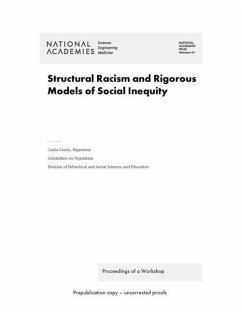
Algebraic Models for Social Networks

PAYBACK Punkte
32 °P sammeln!
The book presents a unified algebraic approach to the structural analysis of complete and local social networks.As the analysis of social networks, or networks of interpersonal and social relationships among social groups, has become an increasingly important method of research in several of the social and behavioural sciences, the gathering of network data has outpaced the development of new methods for its analysis. Addressing the need for analytical tools, Philippa Pattison presents a number of algebraic models for the analysis of network data, explaining in the process the rationale for an...
The book presents a unified algebraic approach to the structural analysis of complete and local social networks.
As the analysis of social networks, or networks of interpersonal and social relationships among social groups, has become an increasingly important method of research in several of the social and behavioural sciences, the gathering of network data has outpaced the development of new methods for its analysis. Addressing the need for analytical tools, Philippa Pattison presents a number of algebraic models for the analysis of network data, explaining in the process the rationale for an algebraic approach. Models are developed for both complete networks, meaning those representing the social ties between all pairs of members in a given group, and local networks, meaning those structured around the social ties of one particular group member. Many applications are presented and the ways that these methods can address a number of important issues confronting network analysis are explained.
Review quote:
"...an excellent discussion of the structure of social networks. There is a wealth of information here and it is a great joy now to have it all in one place."
IJCS
"I admire the intellectual achievement that Pattison presents here. Her book advances the algebraic approach significantly through imaginative conceptual extensions of ideas stated by the White group, together with implementations for data analysis. These yield appreciable progress toward a rigorous basis for network comparisons, which remains one of the most important and vexing problems in the study of social networks."
Peter V. Marsden, Contemporary Sociology
Table of contents:
List of figures and tables; Preface; 1. Algebraic representations for complete social networks; 2. Algebraic representations for local social networks; 3. Comparing algebraic representations; 4. Decompositions of network algebras; 5. An analysis for complete and local networks; 6. Time-dependent social networks; 7. Algebras for valued networks; 8. Issues in network analysis; References; Appendices; Indexes.
As the analysis of social networks, or networks of interpersonal and social relationships among social groups, has become an increasingly important method of research in several of the social and behavioural sciences, the gathering of network data has outpaced the development of new methods for its analysis. Addressing the need for analytical tools, Philippa Pattison presents a number of algebraic models for the analysis of network data, explaining in the process the rationale for an algebraic approach. Models are developed for both complete networks, meaning those representing the social ties between all pairs of members in a given group, and local networks, meaning those structured around the social ties of one particular group member. Many applications are presented and the ways that these methods can address a number of important issues confronting network analysis are explained.
Review quote:
"...an excellent discussion of the structure of social networks. There is a wealth of information here and it is a great joy now to have it all in one place."
IJCS
"I admire the intellectual achievement that Pattison presents here. Her book advances the algebraic approach significantly through imaginative conceptual extensions of ideas stated by the White group, together with implementations for data analysis. These yield appreciable progress toward a rigorous basis for network comparisons, which remains one of the most important and vexing problems in the study of social networks."
Peter V. Marsden, Contemporary Sociology
Table of contents:
List of figures and tables; Preface; 1. Algebraic representations for complete social networks; 2. Algebraic representations for local social networks; 3. Comparing algebraic representations; 4. Decompositions of network algebras; 5. An analysis for complete and local networks; 6. Time-dependent social networks; 7. Algebras for valued networks; 8. Issues in network analysis; References; Appendices; Indexes.














